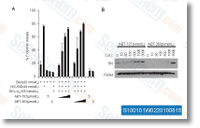Introduction Inflammatory breast cancer is the most metastatic form of breast cancer.IBC ac counts for an estimated 24% of scenarios of state-of-the-art stage breast cancers.Inflammatory breast cancer continues to be de fined like a clinical pathologic entity characterized by dif fuse erythema and edema involving a third or additional from the skin on the breast.The swelling and enlargement from the breast plus the appear ance of dimpled skin defined as peau d orange is asso ciated using the presence of tightly aggregated tumor cells, defined as tumor emboli, that have robust expres sion of E cadherin and are encircled by dermal lymph atic vessels.The involvement of your dermal lymphatics pro vides an avenue for rapid metastasis, connected using the widespread clinical and pathological indicators of axillary and also other loco regional lymph node involvement in IBC pa tients with the time of first diagnosis.
Despite the development of multi modality deal with ment techniques in excess of the past thirty years which have in creased general survival of individuals with non IBC locally state-of-the-art selleck chemical Obatoclax breast cancers, there has become no major modify in survival of IBC patients throughout this exact same time period.The average sur vival of IBC sufferers is significantly under the survival rate of sufferers diagnosed with non IBC lo cally sophisticated breast cancer and also the 10 year survival charge of patients with non T4 breast cancer.Only some genes, this kind of as Rho C GTPase, have already been associated with all the invasive phenotype of IBC as well as the underlying genetic modifications in IBC stay largely undefined. The lack with the comprehending in the molecular underpin nings of IBC points out the significant must recognize ab normalities in gene and protein signaling pathways that are activated in IBC as a way to deliver new therapeutic methods to IBC patients who are routinely excluded from clinical trials.
The selleck current research current initial time proof to the activation of anaplastic lymphoma kinase pathway activation in pre clinical versions of IBC, that was con sistent with detection of elevated gains in copy num bers of ALK, very low degree ALK gene amplification, ALK gene expression or extra rarely, the presence of EML4 ALK translocation in IBC breast tumors. Analysis of breast tumors inside the TGCA database unveiled a signifi cant association concerning basal like breast tumors that have  characteristics of IBC breast tumors and gains in ALK copy number. The dual cMET. ALK inhibitor, Crizotinib, induced major cytotoxicity in ALK IBC cell lines and in vivo studies exposed that this agent in duced major apoptosis in ALK IBC xenografts which was associated with inhibition of phospho ALK signaling activation. Collectively, these results propose that ALK serves as being a therapeutic target for IBC and indi cate that approaches focusing on ALK need to be viewed as for evaluation in clinical trials.
characteristics of IBC breast tumors and gains in ALK copy number. The dual cMET. ALK inhibitor, Crizotinib, induced major cytotoxicity in ALK IBC cell lines and in vivo studies exposed that this agent in duced major apoptosis in ALK IBC xenografts which was associated with inhibition of phospho ALK signaling activation. Collectively, these results propose that ALK serves as being a therapeutic target for IBC and indi cate that approaches focusing on ALK need to be viewed as for evaluation in clinical trials.
AChR signal
There is no boundary to the development of biotechnology and life sciences which are closely linked with human survival and indispensable to people's daily life.
